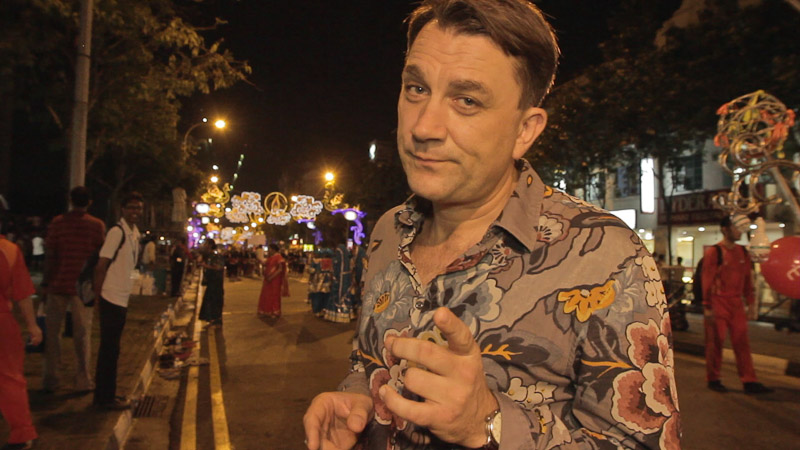Highlights
Quantum dreams: an update on CQT's documentary project
He has been in Singapore little more than two months, but CQT Outreach Fellow Karol Jalochowski is already far into planning and filming for his documentary series. For this update, Karol has provided a synopsis for each episode and a description of why he's chosen topics that some would call controversial and speculative.
But before reading any further, watch the first trailer:
QUANTUM DREAMS - TRAILER ALPHA from Karol Jalochowski on Vimeo.
The trailer features snippets from other clips that are likely to be incorporated somehow in the final documentary: SPLITTER, starring CQT Director Artur Ekert in a human superposition, and COLLAPSE, a collaborative project with CQT Principal Investigator Dagomir Kaszlikowski, which presents a violent reinterpretation of the Schrodinger's cat paradox. Dagomir will be a presenter for the Quantum Dreams series.
Karol is also collaborating with the Strangeweather Movement Group, a group of dancers including CQT Research Fellow Daniel Sahagun Sanchez, which "takes a look at the theory of quantum entanglement, puts it on the backburner, and creates a series of movement scores that together make a dance". See them perform in the short film SPOOKY ACTION (AT A DISTANCE).
Karol is CQT's first Outreach Fellow and will be spending a year on the documentary project. He is on sabbatical from the magazine Polityka. For regular updates, films and photos, follow Karol's blog at www.quantum-dreams.com.
Quantum Dreams
A nontrivial documentary series on the most challenging puzzles of reality (3 episodes, 40 minutes each)
by Karol Jalochowski and collaborators
1. Chasing reality
Adventures and misadventures of a thing called "reality". It used to be known - in the past - as an objective entity. And this notion was demolished at the beginning of the XX century - by the first quantum revolution. It became something much more elusive - something that is created by the very act of measuring it. The episode tells a story of how some rebellious scientists tried to regain it - and how they wonderfully failed. Wonderfully - because the side effect of those efforts was the experimental confirmation of quantum entanglement, the discovery of quantum cryptography - and many more.

One of the locations where Karol has been filming is Singapore's Little India quarter, during the celebrations for Deepavali. Karol writes on his blog: "What does the Deepavali parade has to do with quantum mechanics? A lot. Dag will explain it wonderfully during the very first minutes of our documentary."
2. A Bit of Universe
The second episode will focus on the question of whether the Universe is a giant computer (or isn't). We'll start with the notion of a qubit, tell about the idea of quantum computer - and we'll explain why it is NOT a Holy Grail of computing. Then we'll outline the idea of a computational universe - ending with David Deutsch's, Seth Lloyd's, and Vlatko Vedral's grand (and somewhat) controversial visions of reality.
3. Quantum of Life
Does life hijack the quantumness of reality in order to make itself more efficient? Do animals use subtle quantum mechanism when navigating and using their senses? Do plants employ quantum physics tuning up the photosynthesis processes? Did nature play quantum (and Lamarckian) tricks during Darwinian evolution? And, last but not least, is the consciousness a byproduct of the quantum nature of human brain? We'll explore these areas.
Why these three topics?
One could ask why I did choose such controversial, highly speculative topics. Good question. I did it on purpose. For a few reasons, actually.
I do strongly believe, and the documentary will be the proof of that belief, that quantum mechanics is not only a technical science, turbo charger of the modern civilisation, a tool of computing outcomes, an abstract method for predicting experimental results. It has, or will have, something to tell about the deepest inner working of nature - which is not only a technical question. It's also an existential one. An ontological one. The one that has been pursued in many ways from the very dawn of human consciousness.
The second reason is chosen purely for the sake of dynamic, lively discussion. Questions of whether reality exists (or not), whether the Universe is a giant computer (or isn't), whether quantum phenomena are crucial to the existence of consciousness, etc. are just entry points. There are so many myths and misconceptions about these matters, some of them propagated by popular science media too - we'll have a chance of debunking at least some of them.
One might think that the third reason is somewhat contradictory to the second one - but it isn't. I decided to ask such a big questions because that is also the way science works sometimes: by asking silly questions. As a wonderful Freeman Dyson says (after the Greek philosopher Archilochus), some scientists are hedgehogs, some are foxes. Some are interested in everything, jumping from one subject to another. The others stick with the same problems for decades. And science (humanity too) needs them both - those who pose sometimes even ridiculous questions, and give crude answers, sparking controversies (let's exclude attention addicts), and those who make real, measurable, systematic scientific progress. It is this hedgehog-fox balance that makes science tick, too, I think.






